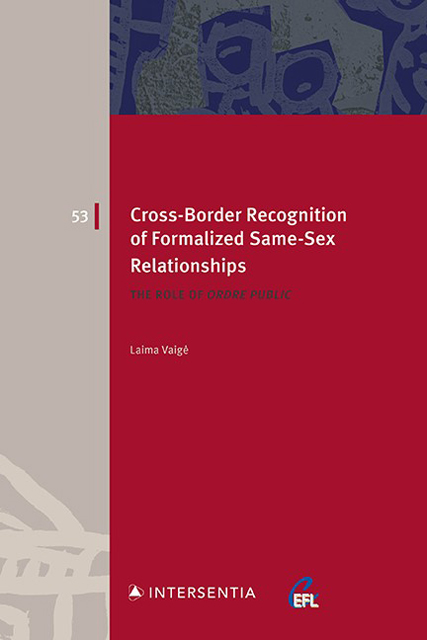Book contents
- Frontmatter
- Preface
- Contents
- List of Abbreviations
- Special Terminology
- List of Legislation and Other Instruments
- List of Cases
- Part I Setting the Stage
- Part II The Ordre Public in the Baltic States and Poland
- Part III The European and the EU Ordre Public
- Part IV Legal Effects of Formalized Same-Sex Relationships: National and Supranational Law
- Part V Law in Context
- Bibliography
- Index
- About the Author
- European Family Law Series
Chapter 9 - Granting Formalized Same-Sex Relationships Certain Legal Effects in Family Law and Beyond: Recognition in Part under Supranational European Law
Published online by Cambridge University Press: 20 April 2023
- Frontmatter
- Preface
- Contents
- List of Abbreviations
- Special Terminology
- List of Legislation and Other Instruments
- List of Cases
- Part I Setting the Stage
- Part II The Ordre Public in the Baltic States and Poland
- Part III The European and the EU Ordre Public
- Part IV Legal Effects of Formalized Same-Sex Relationships: National and Supranational Law
- Part V Law in Context
- Bibliography
- Index
- About the Author
- European Family Law Series
Summary
Introduction to the Chapter
This chapter focuses on legal effects of marriages and registered partnerships under EU law and the ECHR. The structure of the chapter is as follows: first, an explanation of the different points of departure, that is, when the status itself is recognized in full and when it is not ( section 9.2 ). The chapter then analyses a series of examples: section 9.3 examines a request for spousal maintenance in a cross-border dispute; then in section 9.4 , an example of succession following the death of a same-sex spouse or partner and in section 9.5, the last example being a request to divide the property of same-sex spouses or partners. In these parts, scenarios related to the analysed States are described, but the focus is first and foremost on the EU Regulations, with the national perspective and national rulings on these issues analysed in chapter 10. In section 9.6, the chapter focuses on the possibility of granting cross-border effects to same-sex marriages and registered partnerships under the ECHR, including analysis of previous caselaw of the ECtHR and suggestions for the interpretation in the future. Section 9.7 focuses on the general future direction of granting the requested effects under primary and secondary EU law. Finally, section 9.8 concludes the chapter.
Cross-Border Recognition of Legal Effects in Different Situations
If The Civil Status as Such is Recognized in Full
Cross-border recognition of the civil status “in full” would mean that once recognized, the civil status is, in principle, to be followed by all usual legal effects of that civil status. The precise nature and the extent of legal effects are to be determined by applicable law, found through the application of a choice-of-law rule on that particular legal effect.
If the status has not been recognized in full in the forum State, certain legal effects may still be granted but only as an exception, rather than consistently (recognition in part). That is because the extraterritorial recognition of a concluded civil-law status, and the legal effects of that status are two different questions in private international law, governed by different sets of rules.
- Type
- Chapter
- Information
- Cross-Border Recognition of Formalized Same-Sex RelationshipsThe Role of <i>Ordre Public</i>, pp. 301 - 330Publisher: IntersentiaPrint publication year: 2022

